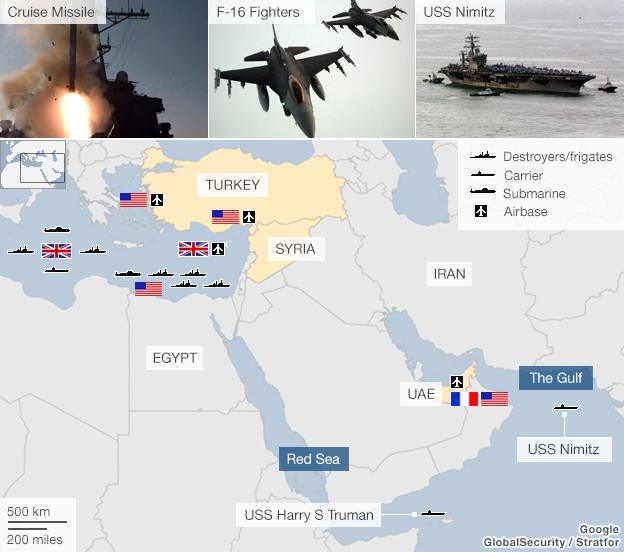Syria crisis: UK puts forward UN proposal
- Published
Jeremy Bowen reports: "People who live in Damascus are nervous about what the next few days will bring"
The UK has put a suggested resolution to the five permanent members of the UN Security Council "authorising all necessary measures to protect civilians" in Syria.
It calls for military action against what Britain has termed Syria's "unacceptable" use of chemical weapons.
But Russia has said the UN must finish its investigation into the claims before discussing any resolution.
Syria has accused the West of "inventing" excuses to launch a strike.
"Western countries, starting with the United States, are inventing fake scenarios and fictitious alibis to intervene militarily in Syria," Prime Minister Wael al-Halqi said on Syrian state television.
British Foreign Secretary William Hague told reporters the international community had a responsibility to take action against the Syrian government, even if agreement could not be reached at the UN.
The Syrian government has strongly denied that it used chemical weapons and blames opposition fighters for the attack on 21 August, which reportedly killed hundreds of people near Damascus.
A team of UN weapons inspectors is currently investigating the sites of the attack. UN General Secretary Ban Ki-moon said the experts were expected to finish their investigation in four days and would need more time after that to analyse their findings.
Mr Ban appealed for the team to be given "time to do its job".
And in a phone conversation with Mr Hague, Russian Foreign Minister Sergei Lavrov said a draft resolution should not be considered until the inspectors had reported.
Russia and China have previously vetoed resolutions critical of Syria.
In a separate development, Syria's ambassador to the UN, Bashar Jaafari, asked for the inspectors to investigate three cases of the use of chemical weapons in the last week against "dozens" of government troops in Damascus suburbs.
'Give peace a chance'
Britain's National Security Council "unanimously" backed action against Syria over its "unacceptable" chemical weapons use, Prime Minister David Cameron said earlier on Wednesday.
He had gathered the UK's armed forces and security chiefs with key cabinet ministers for emergency talks over possible military action, ahead of the UN Security Council meeting.
UN Syria envoy Lakhdar Brahimi: "This confirms how dangerous the situation in Syria is"
On Thursday, British MPs are set to vote on a government motion condemning the attack, but the vote will not authorise direct UK involvement in military action.
The motion says UN weapons inspectors should be allowed to report to the Security Council, after which a further vote on military action may be taken.
Britain's proposed UN resolution would condemn the "chemical weapons attack by [Syria's President] Assad", Mr Cameron added.
Mr Ban earlier called on the council's permanent members - China, Russia, France, the US and the UK - to act together.
"The body interested with maintaining international peace and security cannot be 'missing in action'," Mr Ban said.
He added: "Give peace a chance. Give diplomacy a chance. Stop fighting and... start talking."
The meeting of the five permanent members has now finished, but the UK, US and France are continuing talks. No representative of any of the five countries was prepared to comment officially after the meeting.
Meanwhile, in a briefing to journalists, joint UN-Arab League envoy to Syria Lakhdar Brahimi said: "It does seem clear that some kind of substance was used... that killed a lot of people" on 21 August.
But he also emphasised that any military action would need Security Council authorisation.
Stocks fall
Iran's Supreme Leader Ayatollah Ali Khamenei said on Wednesday that US intervention would be a "disaster" for the region.
"The region is like a gunpowder store and the future cannot be predicted," Mr Khamenei said, according to Iran's Isna news agency.
Meanwhile the Israeli government has authorised a limited call-up of reserve soldiers. Officials told the BBC that although the likelihood of Israel being drawn into fighting with Syria was very low, the country nevertheless had to prepare for that scenario.
Stocks have fallen on global markets and oil prices have shot up amid growing concern about an impending attack on Syria.
The UN weapons inspectors resumed investigations after having called off work on Tuesday because of security concerns.
On Monday, the team's convoy was shot at by unidentified snipers. One of their cars came under fire as it crossed the buffer zone between government and rebel-controlled areas.
More than 100,000 people are estimated to have died since the conflict erupted in Syria in March 2011.

Forces which could be used against Syria:
Four US destroyers - USS Gravely, USS Ramage, USS Barry and USS Mahan - are in the eastern Mediterranean, equipped with cruise missiles
Cruise missiles could also be launched from submarines, including a British Trafalgar class boat. HMS Tireless was reportedly sighted in Gibraltar at the weekend
Airbases at Incirlik and Izmir in Turkey, and in Jordan, could be used to carry out strikes
Two aircraft carriers - USS Nimitz and USS Harry S Truman are in the wider region
The Royal Navy's response force task group- which includes helicopter carrier HMS Illustrious and frigates HMS Montrose and HMS Westminster - is in the region on a previously-scheduled deployment
RAF Akrotiri airbase in Cyprus could also be used
French aircraft carrier Charles de Gaulle is currently in Toulon in the western Mediterranean
French Raffale and Mirage aircraft can also operate from Al-Dhahra airbase in the UAE.